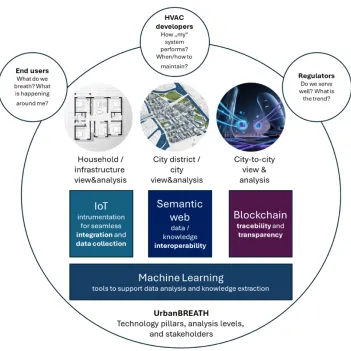UrbanBREATH
Public awareness to assess performance of urban infrastructure based on air quality and its dynamics

© UrbanBREATH
- Category
- Project
- Call
- DUT Call 2024
- Duration
- –
- Project coordinator
- Norwegian University of Science and Technology
Ensuring clean air is a critical component of urban ecosystems, as urban air quality significantly impacts the health of city residents and surrounding wildlife. This project aims to develop and provide deployment strategies for air quality monitoring system based on different urban stakeholders (residents, landlords, infrastructure owners, utility companies, recycling companies). The main focus of the project is on monitoring and decision-making based on ventilation systems for the corresponding stakeholders. The UrbanBREATH project is to provide integrated IoT-based monitoring solution to assess specifics of each of the stakeholders. The research hypothesis is that the performance of each of the stakeholders can be derived based on evaluation of the air quality and there exists intelligent automation strategies allowing for optimization of air quality with simultaneous reduction of energy consumption and carbon footprint of buildings. The project shall allow citizen science to derive and demand potential changes in the community based on unsatisfactory air quality.
As additional by-products or impacts of the project, a predictive, preventive maintenance system will be developed. The system will optimize filter performance in city/urban ventilation systems, helping to reduce urban pollution levels and improve overall air quality. The predictive maintenance can mitigate unexpected downtime in municipality important buildings such as hospitals, kindergartens, prisons, where reliability of equipment is crucial.
The predictive maintenance approach offers numerous benefits that align with urban clean air initiatives. Key advantages include improved energy efficiency, minimized equipment downtime, and streamlined filter maintenance based on real-time data. By alerting maintenance teams to filter clogging and necessary replacements or cleaning, the system enables proactive upkeep and efficient ventilation operations only when air pollution is detected, enhancing overall energy use.
The project will first develop a mobile air analysis concept based on i) type of stakeholders in urban environments; and ii) urban areas with the highest pollution levels / factors, highlighting zones in need for improving filter installations. The developed concept will provide synergetic combination with energy management systems promising energy optimization achieved on account of multi-agent self-organization and machine-learning based modelling of ventilation processes. This will be followed by a design phase focused on developing an IoT-based data collection and analysis solution supporting selection of urban filters that meet technical requirements. The project creates integrated, extendable cityscape to provide access to different stakeholders (residents, landlords, infrastructure owners, utility companies, recycling companies).
The project implements 3 use cases to evaluate UrbanGRADE solution from IoT systems, service integration and performance viewpoints.
Estonia
Norway
Sweden
Luleå University of Technology, Naukatek AS, Tallinn University of Technology, Virumaa College, Virumaa Innovation Centre of Digitalization and Green Technologies
Skat-Keskus AS
Links
Contact
Andrei Lobov
andrei.lobov@ntnu.no